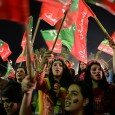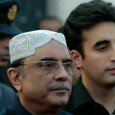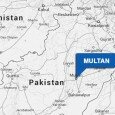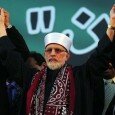By Umair Javed –
The PTI needs to institute a culture of respect for other voters and to realign expectations with a view to removing its ‘now or never’ mentality
While much has been written about the Pakistan Tehreek-i-Insaf over the last year or so, there is still a lot left that requires further exposition.
The elections, for example, have opened up further avenues of inquiry related to the party, specifically on the issue of youth involvement, increased political participation, and entrenchment of democratic norms and mores.
Leaving the task of analyzing actual results and the nitty-gritty of numbers to others, it’s worth taking a look at how electoral activity in urban centres, both big and small, provided evidence of how politics is finally reflecting a rapidly changing society.
Let’s start with the facts: the PTI did well in nearly all major urban centres — Lahore, Rawalpindi, Multan, Karachi, Peshawar, Islamabad — in so far that it obtained a handful of seats, and a majority of the runners-up slots.
They displaced the PPP as the second largest party in the country, in terms of votes at least, and gave the PML-N a run for its money both before and on Election Day. One thing though that needs to be emphasized is that this was made possible by mixing multiple kinds of politics, and not just the youth/middle-class politics that Imran Khan has often talked about.
For starters, a crass rural-urban divide to account for electoral outcomes does not explain how PTI managed millions of votes in rural Punjab without in part wooing local elites, and engaging in promises of patronage dispensation. That’s the traditional side of things, and there is little doubt that it will continue for the foreseeable future.
On the other hand though, the mobilization of the urban electorate was done through macro messaging and mass media campaigning as opposed to the local factional strategies employed by traditional parties.
People volunteered to work with the PTI not because they were part of vertical patronage networks, hoping for reciprocation once in power, but because they — for a lack of a better phrase — genuinely believed in the party’s leadership.
It is this particular demographic, what’s been colloquially referred to as the ‘non-voter’ strata that form Imran Khan’s core electorate, and his most vocal support base. They are the ones articulating the PTI’s anti-corruption, out-with-the-old politics, and the ones championing the party’s cause on the internet and in the print and electronic media. This near-monopolization of the white-collar, aspirational and upper-middle class demographic has resulted in two outcomes: 1) it produced a sense of political involvement in a class that was used to being catered to by the state (army, judiciary, bureaucracy), as opposed to political parties and 2) it made popular politics reflect the political aspirations of a small, but growing segment within the urban population.
One of the most interesting things about democratic politics is that it allows for the collectivization, and perpetuation of interests in the shape of interest groups, political parties, and other civil society formations.
The landed elite, for example, was the first to organize themselves — first in the shape of the Unionist Party and then the Muslim League; the industrialists organized themselves in commerce chambers, and bodies resembling the Pakistan Business Council, and found cohesion under the Ayub regime as important beneficiaries of state patronage.
The intermediate class — the traders, agro-merchants, transporters who grew out of the green revolution economy of the 60s and 70s — first found political voice in the PNA movement, and then became the core electorate for the PML-N.
Finally, the aspirational middle classes, the atomized suburban and urban voters, and second-generation migrants who had experienced consumerist joys during the Musharraf regime, have found an organized participatory voice in the shape of the PTI. This particular strata, as some have argued quite forcefully, has been created by the economic paradigm of the state, as championed by the Zia and Musharraf regimes, and has been borne out of the patronage systems of the state itself. Anecdotally speaking, most young urban professionals can trace the source of their privilege to state employment and state-subsidized education within their preceding generations. The son of a civil servant ends up being a banker, the daughter of an army officer a doctor, and so on.
The unfortunate thing is that many PTI core supporters continue to fall prey to the sense of entitlement their historical sociology has bestowed them with. Used to being catered to by successive military regimes, the messiness of a politics which emphasizes less tangible, and for them, less important aspects like rights and autonomy, is something that they feel needs to be done away with.
This line of thinking, while quite heavily undemocratic, also conveys the sort of naiveté one can associate with new-found political consciousness. This new middle class electorate, which has remained largely shielded from the messiness of traditional politics, is now grappling with its position in the electoral calculus of the entire country. And it’s safe to say, that the lag between their existence as a substantive demographic actor, with vocal service delivery and ideational demands, and their adequate representation in the discourse of electoral politics will persist for some time to come.
Broadly speaking, a big reason for the persistence of the lag between social change and electoral politics is the frequent interruptions of the democratic process by the armed forces. This has resulted in under-formed political parties, weak associational interests, and a strong reliance on electables as the fulcrum of electoral politics.
What is quite heartening though is that with five uninterrupted albeit turbulent years and a smooth, democratic transition of power, we already see the social-political lag being reduced, much greater turnouts, and a move towards party-identification, as opposed to personality-driven politics.
Those who have just entered this process will do well to recognize the importance of the process over one-time solutions, and the benefit of tempering expectations according to ground realities.
PTI has done well to mobilize first-time voters, and to increase acceptance of procedural democracy as the format for transferring power from one set of actors to another. The next step in this rather long and arduous process is to institute a culture of respect for other votersand to realign expectations with a view to removing this ‘now or never’ mentality.
The writer is a columnist based in Lahore and can be reached at [email protected]






























































































